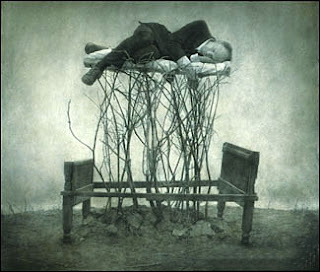It's currently 00:44 and I'm sat downstairs in the living room as I can't sleep. Normally if I can't sleep I just try to stay in bed until, after much tossing and turning, and huffing and puffing, I might eventually fall asleep and catch a few hours rest. But tonight, for some reason I really was just awake and not feeling sleepy at all (might have been something to do with the fact that we did actually go to bed quite early for us (about 11pm) and then I was reading a bit more of IT before turning off the lights.
 |
| Forest Bed, in The Architect's Brother (Parke Harrison) |
I am definitely one of those annoying people who remembers dreams, and anyone who's ever met me, even just once, has mostly likely been subjected to the "I had this weird dream last night..." conversation.
Some people think that dreams might have some clairvoyant properties (especially people who regularly get deja vu), and indeed in ancient times, dreams were thought to be important sources of information about the future, and those who were able to decipher their meanings were thought to have been endowed with special powers of 'sight'. For some people like Freud and the early surrealists like André Breton, dreams were a gateway into the otherwise locked-down subconscious, which if tapped into would either reveal repressed desires in the case of the former, or disable the self-censoring activity of the mind and allow it to discover a higher state of reality in the case of the latter. [As an aside, the french term surréalism, actually refers to the belief in "the superior reality of certain forms of previously neglected associations", i.e. it is more than real, as opposed to unreal.]
Although Freud is often considered the big daddy of psychoanalytic "dream theory", he was certainly not the only person thinking or writing about it in late C19th and early C20th European society. Arthur Schnitzler, also living and writing in Vienna at the same time as Freud (although strangely they never seem to have met despite moving in very similar circles) wrote the story on which Stanley Kubrick's film Eyes Wide Shut was based, Traumnovella, in which the characters express socially unacceptable desires in their dreams, and the confession of these dreamed desires instigates a journey into an underworld of drugs, corruption, and sex, which threatens not only their marriage but their lives. Believers of the wish-fulfillment theory would see in these dream desires an expression of actual repressed desire and therefore an admission of guilt - Michael McIntyre actually did a rather funny sketch at his stand up show in Wembley about 'guilty' dreams:
Others believe very strongly that the content of dreams hold very little scientific value. J. Allan Hobson's Dreaming: A Very Short Introduction, makes the claim that the only meaningful way to study dreams is to analyse their formal features, rather than their content, in other words, to analyse the perceptual, cognitive, and emotional qualities of dreaming as opposed to the individual details of specific dreams.Although my background is more literature, philosophy, and culture, I am certainly not opposed to more scientific approaches (I did do Psychology A-level after all.... and I do love Mythbusters), so I may well try to finish Hobson's book if I have time (I know, I know, it's SHORT, but I have a long reading list already).
 |
| Le Horla, Maupassant |
One of the more interesting texts I have read about dreams though, is Charles Nodier's Smarra, ou les démons de la nuit (1821) which was apparently the first work of literature in the french language in which dreams are the central subject. The bulk of the story deals with the dream narrative of the main character who has just returned home from his wedding party. Heavy with fatigue and wine he drifts off to the sound of the clip clopping of some cart-donkey's hooves going by his window, and starts to dream that he is riding a horse through a forest...
 |
| Smarra, by Charles Nodiers |
To bring this not-so-short post to an end, on the theme of weddings (again) and alcohol and dreams, my younger brother wrote on my Facebook wall today that he'd dreamed that my boyfriend and I had gotten married in Germany, but that thankfully he'd been invited and got to drink lots of Steiners, and it was overall a glorious affair! Believers of the wish-fulfillment, or even clairvoyant qualities of dreams might well want to read lots into that one, but I'm not sure how they would treat my dream from last night, in which I dreamed I was a dolphin swimming around what must have been a partly flooded industrial site after the post-wedding hen-party of one of my co-workers.
Freud can eat his heart out with that one!
No comments:
Post a Comment